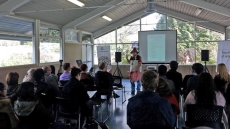“911. Do you require police, ambulance or fire?”
Former 911 operator Rae-Lynne Dicks said these words literally thousands of times during her 10-year career. She listened to the screams of domestic abuse victims as they cried for her help, and the quietly desperate words of sexual assault victims who had been brutally beaten.
She listened to the last words of fire victims waiting to be rescued, and she convinced homicide suspects to stay on the phone with her until police arrived to arrest them. She talked a suicidal man, barricaded in his home, out to safety.
Now living with chronic post-traumatic stress disorder (PTSD), Dicks will share her experiences in healing and post traumatic growth at an upcoming symposium on mental health and first responders at Kwantlen Polytechnic University (KPU) later this month.
“Too often, first responders, and particularly 911 operators, suffer in silence,” says Dicks, who is also a KPU alumna. “The point of this conference is to provide a venue at which students, first responders, professionals, faculty, and members of the community can come together to share our knowledge, resources and support one another.”
“Connections in First Responder Mental Health” is jointly organized by the criminology department at KPU and Badge of Life Canada, a non-profit volunteer organization committed to supporting police and corrections personnel dealing with the psychological injuries suffered in the line of duty. Badge of Life also has a mandate to advance the public’s understanding of operational stress injuries, including post-traumatic stress and suicide prevention.
“We’re trying to spread awareness of the realities of PTSD: that support and treatment are available, and PTSD does not have to end in suicide,” said Alana Abramson, a criminology instructor at KPU helping to organize the conference.
PTSD increases risks of aggression, self-harm, suicide, depression, anxiety, relationship breakdowns, substance misuse, and other troubling health concerns. Often first responders—911 communications operators, law enforcement, fire fighters, paramedics, social workers, emergency room personnel, correctional officers, victims services workers—suffer in silence with PTSD.
Dicks graduated from the public safety communications program at KPU in 1993 and worked as a 911 operator for 10 years before developing PTSD. Her work took her into the depths of other peoples’ despair, until she could no longer hear their stories, or function as a human being. Unable to do the job she loved, Dicks sank into a major depression and was suicidal for two years. Dicks credits her cat, Tomi, for her survival: Tomi refused to leave her alone and set her on the path to healing.
“I am absolutely passionate about breaking the silence surrounding mental health and stress-related injuries for first responders, and I firmly believe that those of us with lived experience have much to contribute to the conversations and the change of the status quo,” affirms Dicks.
“Connections in First Responder Mental Health” is set for Feb. 23 and 24 at KPU Surrey, 12666 72nd Ave. Tickets are available for one or both days of the conference, ranging from $5 for students for one day, to $150 for professionals for both days. For more information, including a full schedule of events and to buy tickets and register, visit https://www.eventbrite.ca/e/connections-in-first-responder-mental-health-tickets-31327856462






